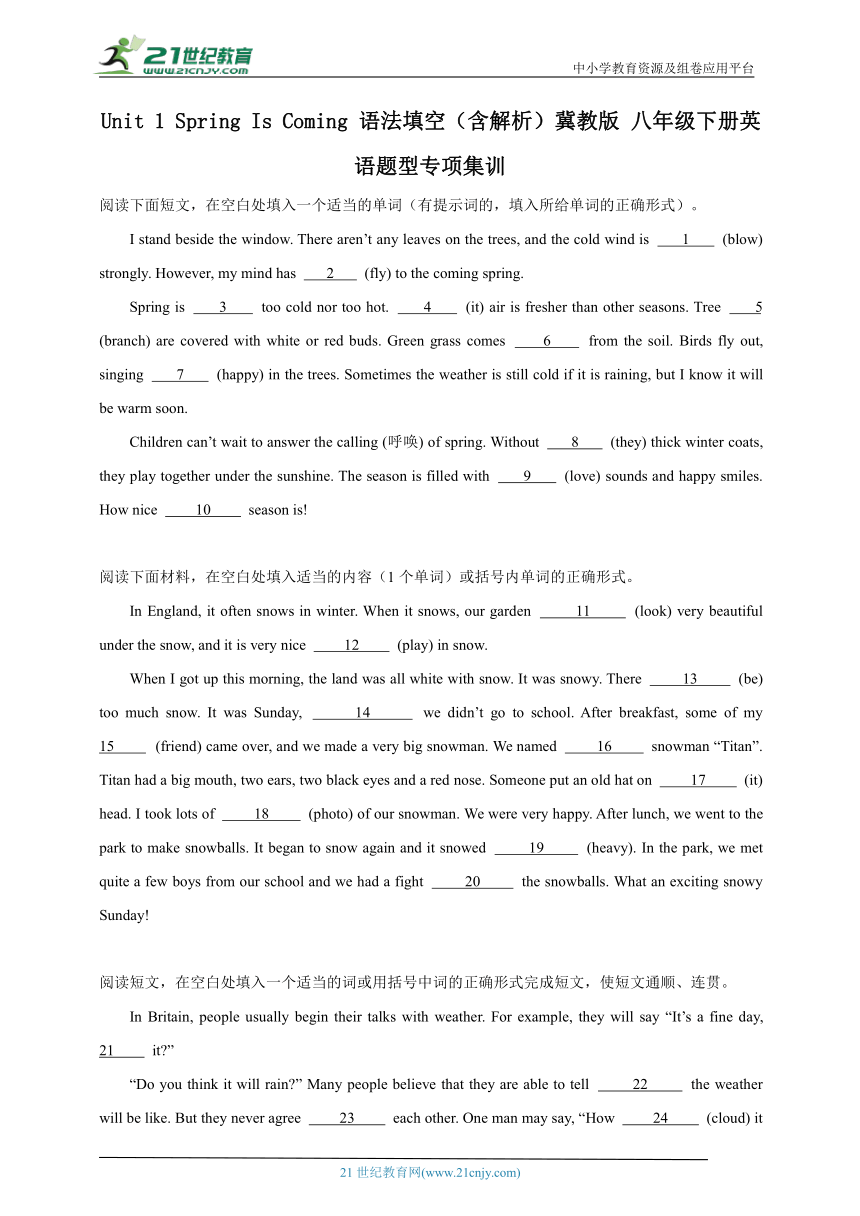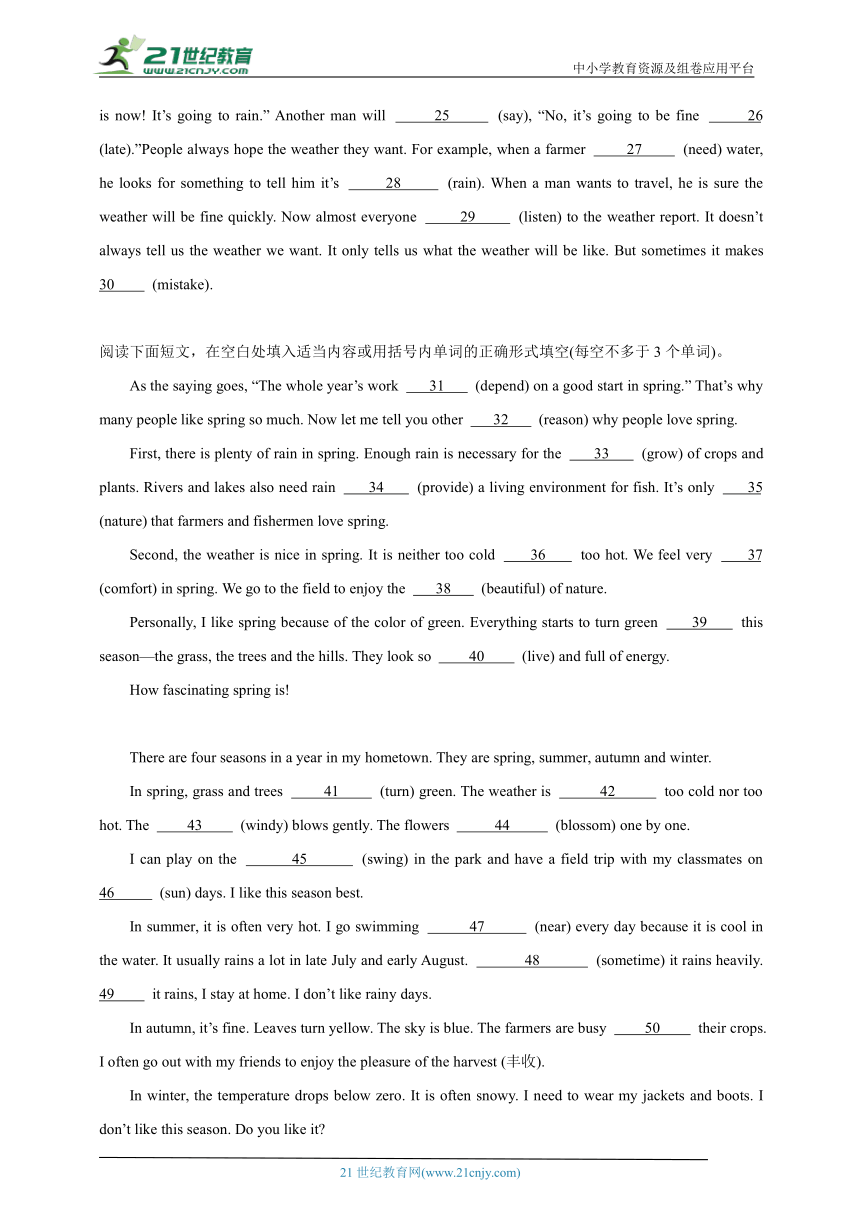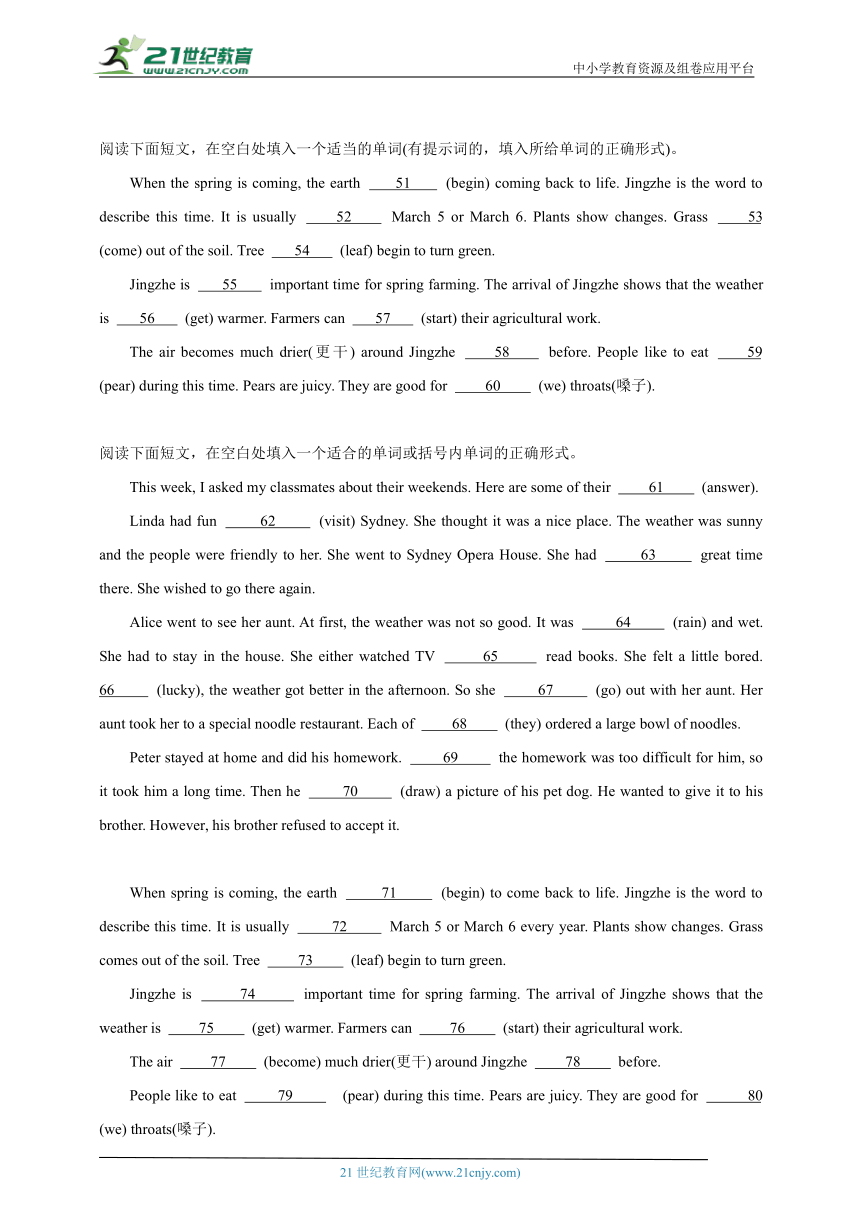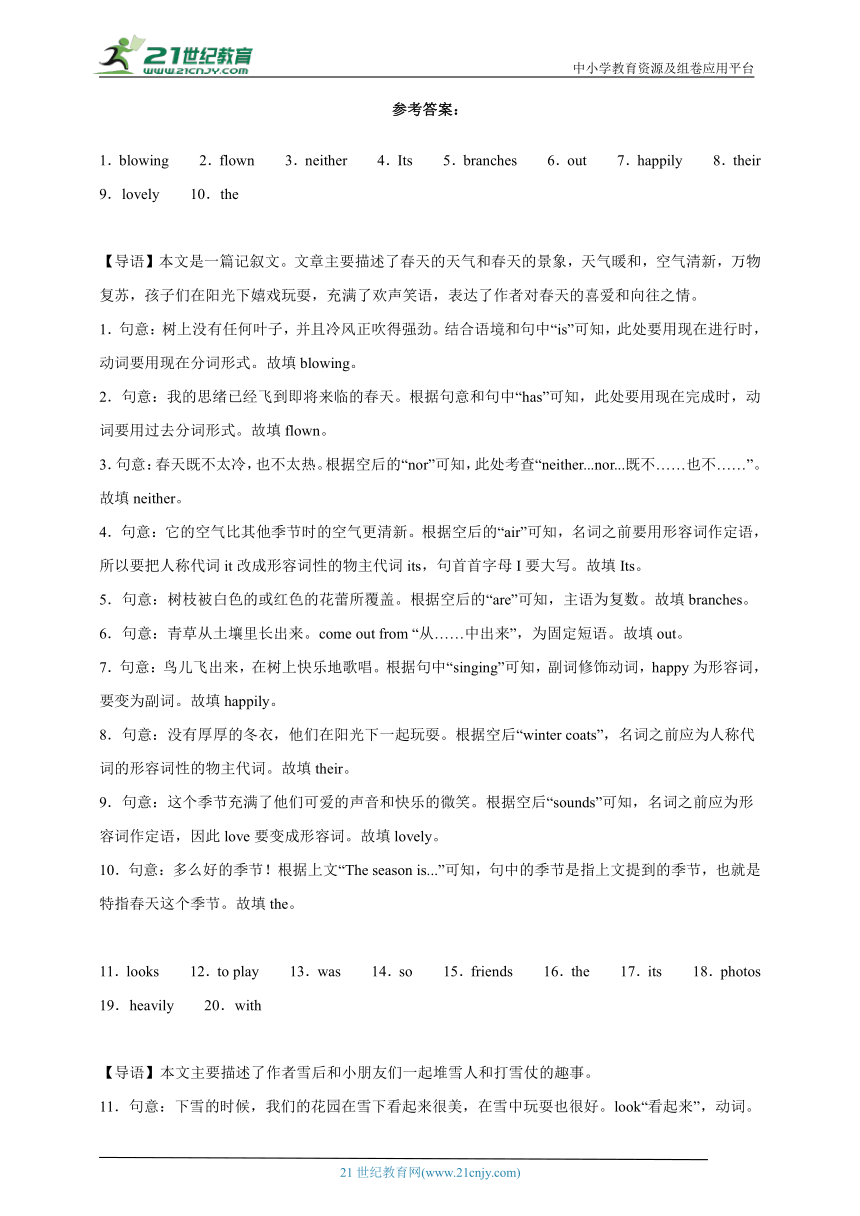Unit 1 Spring Is Coming 语法填空(含解析)冀教版 八年级下册英语题型专项集训
文档属性
| 名称 | Unit 1 Spring Is Coming 语法填空(含解析)冀教版 八年级下册英语题型专项集训 |  | |
| 格式 | docx | ||
| 文件大小 | 283.8KB | ||
| 资源类型 | 试卷 | ||
| 版本资源 | 冀教版 | ||
| 科目 | 英语 | ||
| 更新时间 | 2024-03-01 13:28:54 | ||
图片预览





文档简介
中小学教育资源及组卷应用平台
Unit 1 Spring Is Coming 语法填空(含解析)冀教版 八年级下册英语题型专项集训
阅读下面短文,在空白处填入一个适当的单词(有提示词的,填入所给单词的正确形式)。
I stand beside the window. There aren’t any leaves on the trees, and the cold wind is 1 (blow) strongly. However, my mind has 2 (fly) to the coming spring.
Spring is 3 too cold nor too hot. 4 (it) air is fresher than other seasons. Tree 5 (branch) are covered with white or red buds. Green grass comes 6 from the soil. Birds fly out, singing 7 (happy) in the trees. Sometimes the weather is still cold if it is raining, but I know it will be warm soon.
Children can’t wait to answer the calling (呼唤) of spring. Without 8 (they) thick winter coats, they play together under the sunshine. The season is filled with 9 (love) sounds and happy smiles. How nice 10 season is!
阅读下面材料,在空白处填入适当的内容(1个单词)或括号内单词的正确形式。
In England, it often snows in winter. When it snows, our garden 11 (look) very beautiful under the snow, and it is very nice 12 (play) in snow.
When I got up this morning, the land was all white with snow. It was snowy. There 13 (be) too much snow. It was Sunday, 14 we didn’t go to school. After breakfast, some of my 15 (friend) came over, and we made a very big snowman. We named 16 snowman “Titan”. Titan had a big mouth, two ears, two black eyes and a red nose. Someone put an old hat on 17 (it) head. I took lots of 18 (photo) of our snowman. We were very happy. After lunch, we went to the park to make snowballs. It began to snow again and it snowed 19 (heavy). In the park, we met quite a few boys from our school and we had a fight 20 the snowballs. What an exciting snowy Sunday!
阅读短文,在空白处填入一个适当的词或用括号中词的正确形式完成短文,使短文通顺、连贯。
In Britain, people usually begin their talks with weather. For example, they will say “It’s a fine day, 21 it ”
“Do you think it will rain ” Many people believe that they are able to tell 22 the weather will be like. But they never agree 23 each other. One man may say, “How 24 (cloud) it is now! It’s going to rain.” Another man will 25 (say), “No, it’s going to be fine 26 (late).”People always hope the weather they want. For example, when a farmer 27 (need) water, he looks for something to tell him it’s 28 (rain). When a man wants to travel, he is sure the weather will be fine quickly. Now almost everyone 29 (listen) to the weather report. It doesn’t always tell us the weather we want. It only tells us what the weather will be like. But sometimes it makes 30 (mistake).
阅读下面短文,在空白处填入适当内容或用括号内单词的正确形式填空(每空不多于3个单词)。
As the saying goes, “The whole year’s work 31 (depend) on a good start in spring.” That’s why many people like spring so much. Now let me tell you other 32 (reason) why people love spring.
First, there is plenty of rain in spring. Enough rain is necessary for the 33 (grow) of crops and plants. Rivers and lakes also need rain 34 (provide) a living environment for fish. It’s only 35 (nature) that farmers and fishermen love spring.
Second, the weather is nice in spring. It is neither too cold 36 too hot. We feel very 37 (comfort) in spring. We go to the field to enjoy the 38 (beautiful) of nature.
Personally, I like spring because of the color of green. Everything starts to turn green 39 this season—the grass, the trees and the hills. They look so 40 (live) and full of energy.
How fascinating spring is!
There are four seasons in a year in my hometown. They are spring, summer, autumn and winter.
In spring, grass and trees 41 (turn) green. The weather is 42 too cold nor too hot. The 43 (windy) blows gently. The flowers 44 (blossom) one by one.
I can play on the 45 (swing) in the park and have a field trip with my classmates on 46 (sun) days. I like this season best.
In summer, it is often very hot. I go swimming 47 (near) every day because it is cool in the water. It usually rains a lot in late July and early August. 48 (sometime) it rains heavily. 49 it rains, I stay at home. I don’t like rainy days.
In autumn, it’s fine. Leaves turn yellow. The sky is blue. The farmers are busy 50 their crops. I often go out with my friends to enjoy the pleasure of the harvest (丰收).
In winter, the temperature drops below zero. It is often snowy. I need to wear my jackets and boots. I don’t like this season. Do you like it
阅读下面短文,在空白处填入一个适当的单词(有提示词的,填入所给单词的正确形式)。
When the spring is coming, the earth 51 (begin) coming back to life. Jingzhe is the word to describe this time. It is usually 52 March 5 or March 6. Plants show changes. Grass 53 (come) out of the soil. Tree 54 (leaf) begin to turn green.
Jingzhe is 55 important time for spring farming. The arrival of Jingzhe shows that the weather is 56 (get) warmer. Farmers can 57 (start) their agricultural work.
The air becomes much drier(更干) around Jingzhe 58 before. People like to eat 59 (pear) during this time. Pears are juicy. They are good for 60 (we) throats(嗓子).
阅读下面短文,在空白处填入一个适合的单词或括号内单词的正确形式。
This week, I asked my classmates about their weekends. Here are some of their 61 (answer).
Linda had fun 62 (visit) Sydney. She thought it was a nice place. The weather was sunny and the people were friendly to her. She went to Sydney Opera House. She had 63 great time there. She wished to go there again.
Alice went to see her aunt. At first, the weather was not so good. It was 64 (rain) and wet. She had to stay in the house. She either watched TV 65 read books. She felt a little bored. 66 (lucky), the weather got better in the afternoon. So she 67 (go) out with her aunt. Her aunt took her to a special noodle restaurant. Each of 68 (they) ordered a large bowl of noodles.
Peter stayed at home and did his homework. 69 the homework was too difficult for him, so it took him a long time. Then he 70 (draw) a picture of his pet dog. He wanted to give it to his brother. However, his brother refused to accept it.
When spring is coming, the earth 71 (begin) to come back to life. Jingzhe is the word to describe this time. It is usually 72 March 5 or March 6 every year. Plants show changes. Grass comes out of the soil. Tree 73 (leaf) begin to turn green.
Jingzhe is 74 important time for spring farming. The arrival of Jingzhe shows that the weather is 75 (get) warmer. Farmers can 76 (start) their agricultural work.
The air 77 (become) much drier(更干) around Jingzhe 78 before.
People like to eat 79 (pear) during this time. Pears are juicy. They are good for 80 (we) throats(嗓子).
参考答案:
1.blowing 2.flown 3.neither 4.Its 5.branches 6.out 7.happily 8.their 9.lovely 10.the
【导语】本文是一篇记叙文。文章主要描述了春天的天气和春天的景象,天气暖和,空气清新,万物复苏,孩子们在阳光下嬉戏玩耍,充满了欢声笑语,表达了作者对春天的喜爱和向往之情。
1.句意:树上没有任何叶子,并且冷风正吹得强劲。结合语境和句中“is”可知,此处要用现在进行时,动词要用现在分词形式。故填blowing。
2.句意:我的思绪已经飞到即将来临的春天。根据句意和句中“has”可知,此处要用现在完成时,动词要用过去分词形式。故填flown。
3.句意:春天既不太冷,也不太热。根据空后的“nor”可知,此处考查“neither...nor...既不……也不……”。故填neither。
4.句意:它的空气比其他季节时的空气更清新。根据空后的“air”可知,名词之前要用形容词作定语,所以要把人称代词it改成形容词性的物主代词its,句首首字母I要大写。故填Its。
5.句意:树枝被白色的或红色的花蕾所覆盖。根据空后的“are”可知,主语为复数。故填branches。
6.句意:青草从土壤里长出来。come out from “从……中出来”,为固定短语。故填out。
7.句意:鸟儿飞出来,在树上快乐地歌唱。根据句中“singing”可知,副词修饰动词,happy为形容词,要变为副词。故填happily。
8.句意:没有厚厚的冬衣,他们在阳光下一起玩耍。根据空后“winter coats”,名词之前应为人称代词的形容词性的物主代词。故填their。
9.句意:这个季节充满了他们可爱的声音和快乐的微笑。根据空后“sounds”可知,名词之前应为形容词作定语,因此love要变成形容词。故填lovely。
10.句意:多么好的季节!根据上文“The season is...”可知,句中的季节是指上文提到的季节,也就是特指春天这个季节。故填the。
11.looks 12.to play 13.was 14.so 15.friends 16.the 17.its 18.photos 19.heavily 20.with
【导语】本文主要描述了作者雪后和小朋友们一起堆雪人和打雪仗的趣事。
11.句意:下雪的时候,我们的花园在雪下看起来很美,在雪中玩耍也很好。look“看起来”,动词。根据“When it snows”可知本句时态是一般现在时,主语“our garden”是第三人称单数,动词需用三单形式。故填looks。
12.句意:下雪的时候,我们的花园在雪下看起来很美,在雪中玩耍也很好。play“玩”,动词。固定句型it’s good to do sth.“做某事很好的”,此处动词不定式作真正的主语。故填to play。
13.句意:雪下得太多了。根据“It was snowy.”可知本句是一般过去时,动词需用过去式。there be结构遵循就近原则,“too much snow”是不可数名词,be动词需用was。故填was。
14.句意:那天是星期天,所以我们没去上学。根据“we didn’t go to school.”可知,我们没有去上学是因为那天是星期天。前因后果,需用连词so“因此”。故填so。
15.句意:早餐后,我的一些朋友过来了,我们堆了一个很大的雪人。friend“朋友”,名词。根据“some of my...came over, and we made a very big snowman.”可知,此处是指我的一些朋友,名词需用复数形式。故填friends。
16.句意:我们把雪人命名为“泰坦”。此处是特指上文的雪人,需用定冠词the,the snowman“这个雪人”。故填the。
17.句意:有人把一顶旧帽子戴在它头上。it“它”,主格或宾格。空后有名词“head”,此处需用形容词性物主代词its“它的”来修饰。故填its。
18.句意:我给我们的雪人拍了很多照片。photo“照片”,可数名词。空前lots of“许多”,其后跟名词复数或者不可数名词。photo的复数为photos。故填photos。
19.句意:又开始下雪了,雪下得很大。heavy“重的”,形容词。空前有动词“snowed”,其后需用副词修饰。heavy的副词形式为heavily“大量地”。故填heavily。
20.句意:在公园里,我们遇到了不少来自我们学校的男孩,我们用雪球打了一场雪仗。with表示“用……”。故填with。
21.isn’t 22.what 23.with 24.cloudy 25.say 26.later 27.needs 28.going to rain 29.listens 30.mistakes
【导语】本文讲述了英国人喜欢谈论天气,他们总是用谈天气来开始他们的会话,但他们有时候又并不认可对方对天气的看法,现在,他们更多的是听天气预报,但天气预报有时也会犯错。
21.句意:天气不错,是吧?此处是反意疑问句,满足“前肯后否”的原则,“前肯”是“It’s”,因此“后否”要是“isn’t it”,故填isn’t。
22.句意:许多人相信他们能够预知天气会是什么样子。此处是tell后的宾语从句,且此空作从句的宾语,用what。故填what。
23.句意:但是他们从不同意彼此。agree with sb.“同意某人”,故填with。
24.句意:现在的天气多么多云啊!根据感叹句结构how+形容词+主谓,可知此空是形容词cloudy。故填cloudy。
25.句意:另一个男人会说:“不,之后会变好的。”。情态动词will后接动词say的原形,故填say。
26.句意:另一个男人会说:“不,之后会变好的。”。根据“it’s going to be fine”可知是指之后会变好的,later“之后”,故填later。
27.句意:例如,当一个农民需要水的时候,他会寻找一些东西来告诉他下雨了。结合文章时态,时态为一般现在时,此处主语是a farmer,第三人称单数,谓语动词need用三单形式。故填needs。
28.句意:例如,当一个农民需要水的时候,他会寻找一些东西来告诉他下雨了。根据“looks for something to tell him”可知是寻找一些东西来告诉他将要下雨,用将来时结构be going to+动词原形,故填going to rain。
29.句意:现在几乎每个人都在听天气预报。结合now,时态为现在时,此处主语是everyone,谓语动词listen用三单形式,故填listens。
30.句意:但是有时它会错。make mistakes“犯错”,故填mistakes。
31.depends 32.reasons 33.growth 34.to provide 35.natural 36.nor 37.comfortable 38.beauty 39.in 40.lively
【导语】本文主要介绍了人们喜欢春天的原因。
31.句意:全年的工作取决于春天是否有一个良好的开端。句子用一般现在时,主语是The whole year’s work,谓语动词用单三depends“取决于”。故填depends。
32.句意:现在让我告诉你人们喜欢春天的其他原因。other后加名词复数reasons“原因”。故填reasons。
33.句意:足够的雨水对农作物和植物的生长是必要的。定冠词the后加名词growth“生长”。故填growth。
34.句意:河流和湖泊也需要雨水来为鱼类提供生存环境。provide“提供”,need sth. to do sth.“需要某物做某事”。故填to provide。
35.句意:农民和渔民喜欢春天是很自然的。作be动词的表语用形容词natural“自然的”。故填natural。
36.句意:天既不太冷也不太热。neither...nor“既不……也不”。故填nor。
37.句意:春天我们感觉很舒服。作feel的表语用形容词comfortable“舒服的”。故填comfortable。
38.句意:我们去野外欣赏大自然的美丽。the beauty of“……的美丽”。故填beauty。
39.句意:在这个季节,一切都开始变绿了——草地、树木和山丘。空后是季节,用介词in。故填in。
40.句意:它们看起来生机勃勃,充满活力。作look的表语用形容词lively“生机勃勃的”。故填lively。
41.turn 42.neither 43.wind 44.blossom 45.swings 46.sunny 47.nearly 48.Sometimes 49.When 50.with
【导语】本文是一篇记叙文。文章中作者向我们介绍了家乡的四季。
41.句意:在春天,草和树变绿了。根据语境可知句子时态为一般现在时,而主语grass and trees为复数,故填turn。
42.句意:天气既不太冷也不太热。neither...nor...“既不……也不……”,符合语境,故填neither。
43.句意:风温柔地吹着。此处应填名词作主语,windy“有风的”,形容词,其名词wind“风”符合语境,而由blows可知此处应用其单数形式,故填wind。
44.句意:花儿们依次开放。根据语境可知句子时态为一般现在时,而主语flowers为复数,故填blossom。
45.句意:我能在公园荡秋千并且在晴朗的日子和我的同班同学去郊游。play on the swings“荡秋千”,侧重玩耍,故填swings。
46.句意:我能在公园荡秋千并且在晴朗的日子和我的同班同学去郊游。此处应填形容词作定语,sun“太阳”,名词,其形容词sunny“晴朗的”,符合语境,故填sunny。
47.句意:我几乎每天去游泳因为在水里是凉快的。此处应填副词,根据“because it is cool in the water”可知nearly“几乎”符合语境,故填nearly。
48.句意:有时雨下得很大。根据“...it rains, I stay at home. I don’t like rainy days”可知应是有时下雨,sometimes“有时”符合语境,位于句首首字母需要大写,故填Sometimes。
49.句意:当下雨的时候,我呆在家里。根据“I don’t like rainy days”和“I stay at home”可知when“当……的时候”,符合语境,位于句首首字母需要大写,故填When。
50.句意:农民们忙于他们的庄稼。be busy with sth.“忙于某事”符合语境,故填with。
51.begins 52.on 53.comes 54.leaves 55.an 56.getting 57.start 58.than 59.pears 60.our
【导语】本文是一篇说明文,主要介绍了二十四节气之一——惊蛰的相关情况。
51.句意:当春天来临时,地球开始复苏。由句意可知,表示规律性的情况,时态用一般现在时,且主语the earth是第三人称单数,动词用三单形式,故填begins。
52.句意:通常在每年的3月5日或3月6日。具体日期前,时间介词用on,故填on。
53.句意:草从土里长出来。陈述事实,此句用一般现在时,主语是不可数名词,动词用三单,故填comes。
54.句意:树叶开始变绿。句子是一般现在时且谓语动词begin是原形,所以主语是复数,故填leaves。
55.句意:惊蛰是春耕的重要时节。此处表示泛指,且important发音的第一个音素是元音音素,所以不定冠词用an修饰,故填an。
56.句意:惊蛰的到来表明天气正在变暖。be动词+动词的现在分词,是现在进行时,表示动作正在进行。get的现在分词形式是getting,故填getting。
57.句意:农民可以开始他们的农业工作。can后加动词原形,故填start。
58.句意:惊蛰前后的空气变得比以前干燥多了。由“much drier”可知,是比较级,than“比”,后加比较对象,故填than。
59.句意:人们喜欢在这段时间吃梨。用复数名词表示一类,eat pears“吃梨”,故填pears。
60.句意:它们对我们的喉咙有好处。we“我们”是人称代词,our“我们的”是形容词性物主代词,用形容词物主代词修饰名词throats,故填our。
61.answers 62.visiting 63.a 64.rainy 65.or 66.Luckily 67.went 68.them 69.But 70.drew
【导语】本文主要讲述了Linda、Alice和Peter的周末活动。
61.句意:这儿是他们的一些回答。根据“Here are”可知,需要名词复数,answers符合句意。故填answers。
62.句意:琳达在悉尼玩得很开心。have fun doing sth.“做某事很开心”,动名词作宾语,visiting符合句意。故填visiting。
63.句意:她在那里玩得很开心。have a great time“玩得开心”,a符合句意。故填a。
64.句意:下着雨,很潮湿。根据“was”和“wet”可知,需要形容词作表语,rainy符合句意。故填rainy。
65.句意:她要么看电视要么读书。either ... or ... “要么……要么……”,是固定搭配。故填or。
66.句意:幸运的是,下午天气变好了。根据“the weather got better in the afternoon”可知,需要副词修饰整个句子,Luckily符合句意。故填Luckily。
67.句意:因此她和她姑姑出去了。根据“got”可知用一般过去时,go的过去式went。故填went。
68.句意:她们每个人都点了一大碗面。of后面需要人称宾格,they的宾格是them。故填them。
69.句意:但是家庭作业对他来说太难了,所以他花了很多时间做。根据句意可知,空格前后是转折关系,but符合句意,位于句首,首字母大写。故填But。
70.句意:然后他画了一幅他的宠物狗的画。根据“took”可知用一般过去时,draw的过去式drew。故填drew。
71.begins 72.on 73.leaves 74.an 75.getting 76.start 77.becomes 78.than 79.pears 80.our
【导语】本文是一篇说明文,主要介绍了二十四节气之一——惊蛰的相关情况。
71.句意:当春天来临时,地球开始复苏。由句意可知,表示规律性的情况,时态用一般现在时,且主语the earth是第三人称单数,动词用三单形式,故填begins。
72.句意:通常在每年的3月5日或3月6日。具体日期前,时间介词用on,on March 5 or March 6“在3月5日或3月6日”,故填on。
73.句意:树叶开始变绿。leaf“叶子”,可数名词单数,复数形式是leaves。句子是一般现在时且谓语动词begin是原形,所以主语是复数,故填leaves。
74.句意:惊蛰是春耕的重要时节。an important time for sth“某事的重要时刻”,important发音的第一个音素是元音音素,所以不定冠词用an。故填an。
75.句意:惊蛰的到来表明天气正在变暖。be动词+动词的现在分词,是现在进行时,表示动作正在进行。get的现在分词形式是getting。故填getting。
76.句意:农民可以开始他们的农业工作。can后加动词原形,故填start。
77.句意:惊蛰前后的空气变得比以前干燥多了。由句意可知,表示规律性的情况,时态用一般现在时,且主语the air是第三人称单数,动词用三单形式,故填becomes。
78.句意:惊蛰前后的空气变得比以前干燥多了。由“much drier”可知,是比较级,than“比”,后加比较对象,故填than。
79.句意:人们喜欢在这段时间吃梨。用复数名词表示一类,eat pears“吃梨”,故填pears。
80.句意:它们对我们的喉咙有好处。we“我们”是人称代词,our“我们的”是形容词性物主代词,用形容词物主代词修饰名词throats。故填our。
21世纪教育网 www.21cnjy.com 精品试卷·第 2 页 (共 2 页)
21世纪教育网(www.21cnjy.com)
Unit 1 Spring Is Coming 语法填空(含解析)冀教版 八年级下册英语题型专项集训
阅读下面短文,在空白处填入一个适当的单词(有提示词的,填入所给单词的正确形式)。
I stand beside the window. There aren’t any leaves on the trees, and the cold wind is 1 (blow) strongly. However, my mind has 2 (fly) to the coming spring.
Spring is 3 too cold nor too hot. 4 (it) air is fresher than other seasons. Tree 5 (branch) are covered with white or red buds. Green grass comes 6 from the soil. Birds fly out, singing 7 (happy) in the trees. Sometimes the weather is still cold if it is raining, but I know it will be warm soon.
Children can’t wait to answer the calling (呼唤) of spring. Without 8 (they) thick winter coats, they play together under the sunshine. The season is filled with 9 (love) sounds and happy smiles. How nice 10 season is!
阅读下面材料,在空白处填入适当的内容(1个单词)或括号内单词的正确形式。
In England, it often snows in winter. When it snows, our garden 11 (look) very beautiful under the snow, and it is very nice 12 (play) in snow.
When I got up this morning, the land was all white with snow. It was snowy. There 13 (be) too much snow. It was Sunday, 14 we didn’t go to school. After breakfast, some of my 15 (friend) came over, and we made a very big snowman. We named 16 snowman “Titan”. Titan had a big mouth, two ears, two black eyes and a red nose. Someone put an old hat on 17 (it) head. I took lots of 18 (photo) of our snowman. We were very happy. After lunch, we went to the park to make snowballs. It began to snow again and it snowed 19 (heavy). In the park, we met quite a few boys from our school and we had a fight 20 the snowballs. What an exciting snowy Sunday!
阅读短文,在空白处填入一个适当的词或用括号中词的正确形式完成短文,使短文通顺、连贯。
In Britain, people usually begin their talks with weather. For example, they will say “It’s a fine day, 21 it ”
“Do you think it will rain ” Many people believe that they are able to tell 22 the weather will be like. But they never agree 23 each other. One man may say, “How 24 (cloud) it is now! It’s going to rain.” Another man will 25 (say), “No, it’s going to be fine 26 (late).”People always hope the weather they want. For example, when a farmer 27 (need) water, he looks for something to tell him it’s 28 (rain). When a man wants to travel, he is sure the weather will be fine quickly. Now almost everyone 29 (listen) to the weather report. It doesn’t always tell us the weather we want. It only tells us what the weather will be like. But sometimes it makes 30 (mistake).
阅读下面短文,在空白处填入适当内容或用括号内单词的正确形式填空(每空不多于3个单词)。
As the saying goes, “The whole year’s work 31 (depend) on a good start in spring.” That’s why many people like spring so much. Now let me tell you other 32 (reason) why people love spring.
First, there is plenty of rain in spring. Enough rain is necessary for the 33 (grow) of crops and plants. Rivers and lakes also need rain 34 (provide) a living environment for fish. It’s only 35 (nature) that farmers and fishermen love spring.
Second, the weather is nice in spring. It is neither too cold 36 too hot. We feel very 37 (comfort) in spring. We go to the field to enjoy the 38 (beautiful) of nature.
Personally, I like spring because of the color of green. Everything starts to turn green 39 this season—the grass, the trees and the hills. They look so 40 (live) and full of energy.
How fascinating spring is!
There are four seasons in a year in my hometown. They are spring, summer, autumn and winter.
In spring, grass and trees 41 (turn) green. The weather is 42 too cold nor too hot. The 43 (windy) blows gently. The flowers 44 (blossom) one by one.
I can play on the 45 (swing) in the park and have a field trip with my classmates on 46 (sun) days. I like this season best.
In summer, it is often very hot. I go swimming 47 (near) every day because it is cool in the water. It usually rains a lot in late July and early August. 48 (sometime) it rains heavily. 49 it rains, I stay at home. I don’t like rainy days.
In autumn, it’s fine. Leaves turn yellow. The sky is blue. The farmers are busy 50 their crops. I often go out with my friends to enjoy the pleasure of the harvest (丰收).
In winter, the temperature drops below zero. It is often snowy. I need to wear my jackets and boots. I don’t like this season. Do you like it
阅读下面短文,在空白处填入一个适当的单词(有提示词的,填入所给单词的正确形式)。
When the spring is coming, the earth 51 (begin) coming back to life. Jingzhe is the word to describe this time. It is usually 52 March 5 or March 6. Plants show changes. Grass 53 (come) out of the soil. Tree 54 (leaf) begin to turn green.
Jingzhe is 55 important time for spring farming. The arrival of Jingzhe shows that the weather is 56 (get) warmer. Farmers can 57 (start) their agricultural work.
The air becomes much drier(更干) around Jingzhe 58 before. People like to eat 59 (pear) during this time. Pears are juicy. They are good for 60 (we) throats(嗓子).
阅读下面短文,在空白处填入一个适合的单词或括号内单词的正确形式。
This week, I asked my classmates about their weekends. Here are some of their 61 (answer).
Linda had fun 62 (visit) Sydney. She thought it was a nice place. The weather was sunny and the people were friendly to her. She went to Sydney Opera House. She had 63 great time there. She wished to go there again.
Alice went to see her aunt. At first, the weather was not so good. It was 64 (rain) and wet. She had to stay in the house. She either watched TV 65 read books. She felt a little bored. 66 (lucky), the weather got better in the afternoon. So she 67 (go) out with her aunt. Her aunt took her to a special noodle restaurant. Each of 68 (they) ordered a large bowl of noodles.
Peter stayed at home and did his homework. 69 the homework was too difficult for him, so it took him a long time. Then he 70 (draw) a picture of his pet dog. He wanted to give it to his brother. However, his brother refused to accept it.
When spring is coming, the earth 71 (begin) to come back to life. Jingzhe is the word to describe this time. It is usually 72 March 5 or March 6 every year. Plants show changes. Grass comes out of the soil. Tree 73 (leaf) begin to turn green.
Jingzhe is 74 important time for spring farming. The arrival of Jingzhe shows that the weather is 75 (get) warmer. Farmers can 76 (start) their agricultural work.
The air 77 (become) much drier(更干) around Jingzhe 78 before.
People like to eat 79 (pear) during this time. Pears are juicy. They are good for 80 (we) throats(嗓子).
参考答案:
1.blowing 2.flown 3.neither 4.Its 5.branches 6.out 7.happily 8.their 9.lovely 10.the
【导语】本文是一篇记叙文。文章主要描述了春天的天气和春天的景象,天气暖和,空气清新,万物复苏,孩子们在阳光下嬉戏玩耍,充满了欢声笑语,表达了作者对春天的喜爱和向往之情。
1.句意:树上没有任何叶子,并且冷风正吹得强劲。结合语境和句中“is”可知,此处要用现在进行时,动词要用现在分词形式。故填blowing。
2.句意:我的思绪已经飞到即将来临的春天。根据句意和句中“has”可知,此处要用现在完成时,动词要用过去分词形式。故填flown。
3.句意:春天既不太冷,也不太热。根据空后的“nor”可知,此处考查“neither...nor...既不……也不……”。故填neither。
4.句意:它的空气比其他季节时的空气更清新。根据空后的“air”可知,名词之前要用形容词作定语,所以要把人称代词it改成形容词性的物主代词its,句首首字母I要大写。故填Its。
5.句意:树枝被白色的或红色的花蕾所覆盖。根据空后的“are”可知,主语为复数。故填branches。
6.句意:青草从土壤里长出来。come out from “从……中出来”,为固定短语。故填out。
7.句意:鸟儿飞出来,在树上快乐地歌唱。根据句中“singing”可知,副词修饰动词,happy为形容词,要变为副词。故填happily。
8.句意:没有厚厚的冬衣,他们在阳光下一起玩耍。根据空后“winter coats”,名词之前应为人称代词的形容词性的物主代词。故填their。
9.句意:这个季节充满了他们可爱的声音和快乐的微笑。根据空后“sounds”可知,名词之前应为形容词作定语,因此love要变成形容词。故填lovely。
10.句意:多么好的季节!根据上文“The season is...”可知,句中的季节是指上文提到的季节,也就是特指春天这个季节。故填the。
11.looks 12.to play 13.was 14.so 15.friends 16.the 17.its 18.photos 19.heavily 20.with
【导语】本文主要描述了作者雪后和小朋友们一起堆雪人和打雪仗的趣事。
11.句意:下雪的时候,我们的花园在雪下看起来很美,在雪中玩耍也很好。look“看起来”,动词。根据“When it snows”可知本句时态是一般现在时,主语“our garden”是第三人称单数,动词需用三单形式。故填looks。
12.句意:下雪的时候,我们的花园在雪下看起来很美,在雪中玩耍也很好。play“玩”,动词。固定句型it’s good to do sth.“做某事很好的”,此处动词不定式作真正的主语。故填to play。
13.句意:雪下得太多了。根据“It was snowy.”可知本句是一般过去时,动词需用过去式。there be结构遵循就近原则,“too much snow”是不可数名词,be动词需用was。故填was。
14.句意:那天是星期天,所以我们没去上学。根据“we didn’t go to school.”可知,我们没有去上学是因为那天是星期天。前因后果,需用连词so“因此”。故填so。
15.句意:早餐后,我的一些朋友过来了,我们堆了一个很大的雪人。friend“朋友”,名词。根据“some of my...came over, and we made a very big snowman.”可知,此处是指我的一些朋友,名词需用复数形式。故填friends。
16.句意:我们把雪人命名为“泰坦”。此处是特指上文的雪人,需用定冠词the,the snowman“这个雪人”。故填the。
17.句意:有人把一顶旧帽子戴在它头上。it“它”,主格或宾格。空后有名词“head”,此处需用形容词性物主代词its“它的”来修饰。故填its。
18.句意:我给我们的雪人拍了很多照片。photo“照片”,可数名词。空前lots of“许多”,其后跟名词复数或者不可数名词。photo的复数为photos。故填photos。
19.句意:又开始下雪了,雪下得很大。heavy“重的”,形容词。空前有动词“snowed”,其后需用副词修饰。heavy的副词形式为heavily“大量地”。故填heavily。
20.句意:在公园里,我们遇到了不少来自我们学校的男孩,我们用雪球打了一场雪仗。with表示“用……”。故填with。
21.isn’t 22.what 23.with 24.cloudy 25.say 26.later 27.needs 28.going to rain 29.listens 30.mistakes
【导语】本文讲述了英国人喜欢谈论天气,他们总是用谈天气来开始他们的会话,但他们有时候又并不认可对方对天气的看法,现在,他们更多的是听天气预报,但天气预报有时也会犯错。
21.句意:天气不错,是吧?此处是反意疑问句,满足“前肯后否”的原则,“前肯”是“It’s”,因此“后否”要是“isn’t it”,故填isn’t。
22.句意:许多人相信他们能够预知天气会是什么样子。此处是tell后的宾语从句,且此空作从句的宾语,用what。故填what。
23.句意:但是他们从不同意彼此。agree with sb.“同意某人”,故填with。
24.句意:现在的天气多么多云啊!根据感叹句结构how+形容词+主谓,可知此空是形容词cloudy。故填cloudy。
25.句意:另一个男人会说:“不,之后会变好的。”。情态动词will后接动词say的原形,故填say。
26.句意:另一个男人会说:“不,之后会变好的。”。根据“it’s going to be fine”可知是指之后会变好的,later“之后”,故填later。
27.句意:例如,当一个农民需要水的时候,他会寻找一些东西来告诉他下雨了。结合文章时态,时态为一般现在时,此处主语是a farmer,第三人称单数,谓语动词need用三单形式。故填needs。
28.句意:例如,当一个农民需要水的时候,他会寻找一些东西来告诉他下雨了。根据“looks for something to tell him”可知是寻找一些东西来告诉他将要下雨,用将来时结构be going to+动词原形,故填going to rain。
29.句意:现在几乎每个人都在听天气预报。结合now,时态为现在时,此处主语是everyone,谓语动词listen用三单形式,故填listens。
30.句意:但是有时它会错。make mistakes“犯错”,故填mistakes。
31.depends 32.reasons 33.growth 34.to provide 35.natural 36.nor 37.comfortable 38.beauty 39.in 40.lively
【导语】本文主要介绍了人们喜欢春天的原因。
31.句意:全年的工作取决于春天是否有一个良好的开端。句子用一般现在时,主语是The whole year’s work,谓语动词用单三depends“取决于”。故填depends。
32.句意:现在让我告诉你人们喜欢春天的其他原因。other后加名词复数reasons“原因”。故填reasons。
33.句意:足够的雨水对农作物和植物的生长是必要的。定冠词the后加名词growth“生长”。故填growth。
34.句意:河流和湖泊也需要雨水来为鱼类提供生存环境。provide“提供”,need sth. to do sth.“需要某物做某事”。故填to provide。
35.句意:农民和渔民喜欢春天是很自然的。作be动词的表语用形容词natural“自然的”。故填natural。
36.句意:天既不太冷也不太热。neither...nor“既不……也不”。故填nor。
37.句意:春天我们感觉很舒服。作feel的表语用形容词comfortable“舒服的”。故填comfortable。
38.句意:我们去野外欣赏大自然的美丽。the beauty of“……的美丽”。故填beauty。
39.句意:在这个季节,一切都开始变绿了——草地、树木和山丘。空后是季节,用介词in。故填in。
40.句意:它们看起来生机勃勃,充满活力。作look的表语用形容词lively“生机勃勃的”。故填lively。
41.turn 42.neither 43.wind 44.blossom 45.swings 46.sunny 47.nearly 48.Sometimes 49.When 50.with
【导语】本文是一篇记叙文。文章中作者向我们介绍了家乡的四季。
41.句意:在春天,草和树变绿了。根据语境可知句子时态为一般现在时,而主语grass and trees为复数,故填turn。
42.句意:天气既不太冷也不太热。neither...nor...“既不……也不……”,符合语境,故填neither。
43.句意:风温柔地吹着。此处应填名词作主语,windy“有风的”,形容词,其名词wind“风”符合语境,而由blows可知此处应用其单数形式,故填wind。
44.句意:花儿们依次开放。根据语境可知句子时态为一般现在时,而主语flowers为复数,故填blossom。
45.句意:我能在公园荡秋千并且在晴朗的日子和我的同班同学去郊游。play on the swings“荡秋千”,侧重玩耍,故填swings。
46.句意:我能在公园荡秋千并且在晴朗的日子和我的同班同学去郊游。此处应填形容词作定语,sun“太阳”,名词,其形容词sunny“晴朗的”,符合语境,故填sunny。
47.句意:我几乎每天去游泳因为在水里是凉快的。此处应填副词,根据“because it is cool in the water”可知nearly“几乎”符合语境,故填nearly。
48.句意:有时雨下得很大。根据“...it rains, I stay at home. I don’t like rainy days”可知应是有时下雨,sometimes“有时”符合语境,位于句首首字母需要大写,故填Sometimes。
49.句意:当下雨的时候,我呆在家里。根据“I don’t like rainy days”和“I stay at home”可知when“当……的时候”,符合语境,位于句首首字母需要大写,故填When。
50.句意:农民们忙于他们的庄稼。be busy with sth.“忙于某事”符合语境,故填with。
51.begins 52.on 53.comes 54.leaves 55.an 56.getting 57.start 58.than 59.pears 60.our
【导语】本文是一篇说明文,主要介绍了二十四节气之一——惊蛰的相关情况。
51.句意:当春天来临时,地球开始复苏。由句意可知,表示规律性的情况,时态用一般现在时,且主语the earth是第三人称单数,动词用三单形式,故填begins。
52.句意:通常在每年的3月5日或3月6日。具体日期前,时间介词用on,故填on。
53.句意:草从土里长出来。陈述事实,此句用一般现在时,主语是不可数名词,动词用三单,故填comes。
54.句意:树叶开始变绿。句子是一般现在时且谓语动词begin是原形,所以主语是复数,故填leaves。
55.句意:惊蛰是春耕的重要时节。此处表示泛指,且important发音的第一个音素是元音音素,所以不定冠词用an修饰,故填an。
56.句意:惊蛰的到来表明天气正在变暖。be动词+动词的现在分词,是现在进行时,表示动作正在进行。get的现在分词形式是getting,故填getting。
57.句意:农民可以开始他们的农业工作。can后加动词原形,故填start。
58.句意:惊蛰前后的空气变得比以前干燥多了。由“much drier”可知,是比较级,than“比”,后加比较对象,故填than。
59.句意:人们喜欢在这段时间吃梨。用复数名词表示一类,eat pears“吃梨”,故填pears。
60.句意:它们对我们的喉咙有好处。we“我们”是人称代词,our“我们的”是形容词性物主代词,用形容词物主代词修饰名词throats,故填our。
61.answers 62.visiting 63.a 64.rainy 65.or 66.Luckily 67.went 68.them 69.But 70.drew
【导语】本文主要讲述了Linda、Alice和Peter的周末活动。
61.句意:这儿是他们的一些回答。根据“Here are”可知,需要名词复数,answers符合句意。故填answers。
62.句意:琳达在悉尼玩得很开心。have fun doing sth.“做某事很开心”,动名词作宾语,visiting符合句意。故填visiting。
63.句意:她在那里玩得很开心。have a great time“玩得开心”,a符合句意。故填a。
64.句意:下着雨,很潮湿。根据“was”和“wet”可知,需要形容词作表语,rainy符合句意。故填rainy。
65.句意:她要么看电视要么读书。either ... or ... “要么……要么……”,是固定搭配。故填or。
66.句意:幸运的是,下午天气变好了。根据“the weather got better in the afternoon”可知,需要副词修饰整个句子,Luckily符合句意。故填Luckily。
67.句意:因此她和她姑姑出去了。根据“got”可知用一般过去时,go的过去式went。故填went。
68.句意:她们每个人都点了一大碗面。of后面需要人称宾格,they的宾格是them。故填them。
69.句意:但是家庭作业对他来说太难了,所以他花了很多时间做。根据句意可知,空格前后是转折关系,but符合句意,位于句首,首字母大写。故填But。
70.句意:然后他画了一幅他的宠物狗的画。根据“took”可知用一般过去时,draw的过去式drew。故填drew。
71.begins 72.on 73.leaves 74.an 75.getting 76.start 77.becomes 78.than 79.pears 80.our
【导语】本文是一篇说明文,主要介绍了二十四节气之一——惊蛰的相关情况。
71.句意:当春天来临时,地球开始复苏。由句意可知,表示规律性的情况,时态用一般现在时,且主语the earth是第三人称单数,动词用三单形式,故填begins。
72.句意:通常在每年的3月5日或3月6日。具体日期前,时间介词用on,on March 5 or March 6“在3月5日或3月6日”,故填on。
73.句意:树叶开始变绿。leaf“叶子”,可数名词单数,复数形式是leaves。句子是一般现在时且谓语动词begin是原形,所以主语是复数,故填leaves。
74.句意:惊蛰是春耕的重要时节。an important time for sth“某事的重要时刻”,important发音的第一个音素是元音音素,所以不定冠词用an。故填an。
75.句意:惊蛰的到来表明天气正在变暖。be动词+动词的现在分词,是现在进行时,表示动作正在进行。get的现在分词形式是getting。故填getting。
76.句意:农民可以开始他们的农业工作。can后加动词原形,故填start。
77.句意:惊蛰前后的空气变得比以前干燥多了。由句意可知,表示规律性的情况,时态用一般现在时,且主语the air是第三人称单数,动词用三单形式,故填becomes。
78.句意:惊蛰前后的空气变得比以前干燥多了。由“much drier”可知,是比较级,than“比”,后加比较对象,故填than。
79.句意:人们喜欢在这段时间吃梨。用复数名词表示一类,eat pears“吃梨”,故填pears。
80.句意:它们对我们的喉咙有好处。we“我们”是人称代词,our“我们的”是形容词性物主代词,用形容词物主代词修饰名词throats。故填our。
21世纪教育网 www.21cnjy.com 精品试卷·第 2 页 (共 2 页)
21世纪教育网(www.21cnjy.com)
同课章节目录
- Unit 1 Spring Is Coming
- Lesson 1 How's the weather?
- Lesson 2 It's Getting Warmer!
- Lesson 3 Sun Is Rising
- Lesson 4 The Spring City
- Lesson 5 Babysitting on a Spring Day
- Lesson 6 Stories about Spring
- Unit 2 Plant a Plant
- Lesson 7 Planting Trees
- Lesson 8 Why Are Plants Important?
- Lesson 9 Gardening with Mary
- Lesson 10 Make Your Garden Grow!
- Lesson 11 Amazing Plants
- Lesson 12 Danny's Plant
- Unit 3 Animals Are Our Friends
- Lesson 13 Danny's Big Scare
- Lesson 14 Amazing Animals
- Lesson 15 The Zoo Is Open
- Lesson 16 The Pear Escaped
- Lesson 17 Save the Tigers
- Lesson 18 Friendship Between Animals
- Unit 4 The Internet Connects Us
- Lesson 19 How Do You Use the Internet?
- Lesson 20 A Computer Helps!
- Lesson 21 Books or Computers?
- Lesson 22 Travel on the Internet
- Lesson 23 The Internet--Good or Bad?
- Lesson 24 An E-mail to Grandpa
- Unit 5 Buying and Selling
- Lesson 25 Raising Money
- Lesson 26 Cookies, Please!
- Lesson 27 Business English
- Lesson 28 Ms. Liu's Great Idea
- Lesson 29 How to Push a Product
- Lesson 30 A Cookie Sale
- Unit 6 Be a Champion!
- Lesson 31 Don't Fall, Danny
- Lesson 32 My Favourite Record
- Lesson 33 2800 Years of Sports
- Lesson 34 Modern Olympics
- Lesson 35 The Dream Team
- Lesson 36 Classroom Olympics
- Unit 7 Know Our World
- Lesson 37 Let's Learn Geography!
- Lesson 38 The World Is a Big Place
- Lesson 39 Ring Up or Call?
- Lesson 40 Body Language
- Lesson 41 A Class of the World
- Lesson 42 North America
- Unit 8 Save Our World
- Lesson 43 Let's Clean Up!
- Lesson 44 Environment Clubs
- Lesson 45 Let's Sort Garbage!
- Lesson 46 Protect Our Environment
- Lesson 47 Connected to Nature
- Lesson 48 Garbage Is Interesting!
